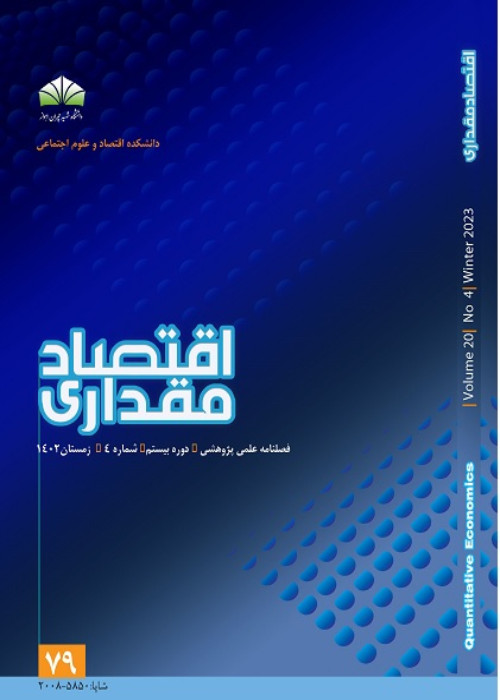The Comprehensive Analysis of the Impact of Globalization on Environmental Pollution in Iran with Emphasizing on Triple Dimensions and Dual Components
In recent decades, the industrialization of countries has been one of the main factors for the increase of greenhouse gas emissions, which has led to severe environmental damage such as global warming, temperature inversion. In addition, the increase of environmental pollutants may have a negative impact on the health of individuals in the long run, thus increasing government health expenditures. In addition to the various factors affecting greenhouse gas emissions, globalization (economic, social, and political) can also affect the environment through various channels. For example, economic globalization affects the environment through the channels of income, composition, and technology. Moreover, social globalization can change the state of the environment through the media, the principle of mental distance, transportation, and access to knowledge and international events. Political globalization may also have an impact on the environment through the efficiency of intergovernmental organizations and international treaties. Considering the possible role of globalization (economic, social, and political) on the environment, this study attempts to investigate the relationship between globalization (economic, social, and political) and carbon dioxide emissions in Iran during 1979-2017 based on the Autoregressive Distributed Lag (ARDL) approach. Moreover, this study tests the hypothesis of Martens et al. (2015) about the effectiveness of the globalization index results in terms of components (de facto and de jure). For further clarification, the study examines the above hypothesis using the three dimensions of economic, social, and political. In addition, the KOF Globalization Index is used, which consists of three dimensions: Economic, Social and Political, and each of the dimensions has two de facto and de jure components. Clearly, the impact of each of these dimensions of globalization and its components on the emission of environmental pollutants may be different. It should also be noted that the two de facto and de jure components in the KOF Globalization Index are known as a new classification introduced by Martens et al. (2015).
As mentioned in the introduction, the aim of this study is to analyze the effect of globalization on pollution in Iran. In order to make a comprehensive analysis, the dimensions (economic, social and political) and components (de facto and de jure) of globalization are also utilized. According to the theoretical and experimental studies, the regression model is specified in two formats, one is based on the dimensions of globalization (economic, social, and political) and the other is based on the components of globalization (de facto and de jure).
First model: the effect of globalization at the level of j on environmental pollution
The basis of the first model is the regression equation in equation (1). EP represents the logarithm of carbon dioxide emissions. EC represents the logarithm of energy consumption, Pop represents the logarithm of population, GDP and GDP2 represent the logarithm of real gross domestic product and its square, respectively. In addition, Gloj represents the logarithm of the globalization index at level j, including total (T), economic (E), social (S), and political (P).
Based on equation (1), the ARDL(p,q,r,s,t,u) model is designed in the form of equation (2). In this regard, is the coefficient of autocorrelation, is the coefficient of globalization index intervals; And to are coefficients of interruptions of energy consumption, real GDP, square of real GDP and population, respectively.
Based on equation (2), the error correction model and long-run coefficients in the form of equation (3) is specified as follows:
the effect of Components of globalization at the level of j on environmental pollution
The basis of the model in this format is the regression equation in equation (4), where GloDeFaj and GloDeJej are respectively the logarithm of the de facto and de jure globalization indexes at level j.
Similarly, based on equation (4), the ARDL(p,q,r,s,t,u,v) model is designed in the form of equation (5), where θ_1j and θ_2j are the coefficients of de facto and de jure globalization index at level j, respectively.
Based on equation (5), the model of error correction and long-run coefficients is specified in the form of equation (6) as follows:
The results of the data descriptions show that the dimensions and components of the globalization index have different trends, and carbon dioxide emissions have had an increasing trend since Iran's Islamic Revolution. The estimation results of the models indicate that the economic and social globalization indices have a positive effect on carbon dioxide emissions in the short term. Moreover, the de facto component of total and economic globalization has a negative effect on CO2 emissions. Furthermore, the de facto component of the social and political globalization index has a positive effect on carbon dioxide emissions, while the de facto component of total and economic globalization with a one-year lag has a positive effect on carbon dioxide emissions. In the long run, the total globalization index has no significant effect on carbon dioxide emissions, but two dimensions of social and economic globalization have a direct effect on carbon dioxide emissions. Besides, the de jure component of the total globalization index and the de jure component of the economic, social, and political dimensions directly affect carbon dioxide emissions, but the de facto component of the total and economic globalization index has a reverse effect on carbon dioxide emissions. Moreover, energy consumption and population have a direct effect on CO2 emissions, and the Environmental Kuznets Curve (EKC) hypothesis cannot be rejected in Iran. The hypothesis of Martens et al. (2015) is also not rejected in this study.
On this basis, it is suggested that economic, social, and political decision-makers pay attention to the negative environmental impacts of the de jure component of economic, social, and political globalization and take action to optimize the environmental impacts of the de jure component of each of the three dimensions by looking closely at each of the sub-dimensions. Moreover, considering the favorable effect of the de facto component of economic globalization on the environment, it is better to give higher priority to economic globalization from a de facto point of view than to economic globalization from a de jure one, so that the Iranian economy can benefit from the advantages of globalization in the field of economy, as well as the environment can be spared from the damages caused by the expansion of the economy.
- حق عضویت دریافتی صرف حمایت از نشریات عضو و نگهداری، تکمیل و توسعه مگیران میشود.
- پرداخت حق اشتراک و دانلود مقالات اجازه بازنشر آن در سایر رسانههای چاپی و دیجیتال را به کاربر نمیدهد.




